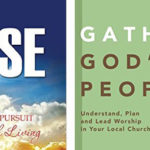The Language of Science and Faith, by Karl W. Giberson & Francis S. Collins (InterVarsity Press)

|
When picking up a book titled The Language of Science and Faith, one expects a tedious read, full of expert terminology and concepts not relatable to the common person. Giberson and Collins fully dismiss this apprehension, however, and provide very "straight answers to genuine questions," to quote from their subtitle.
Approaching the problem of reconciling the Bible with science from an evolutionary standpoint, the authors present evidence in favor of adhering to a nonliteral understanding of Genesis and instead embracing the theories of biology. The solution is simple—a less rigid (and according to the authors' evidence, more historical) reading of Genesis opens the door for evolution to explain not the Who of creation, but the how.
Although these conclusions may not convince some who hold a literal interpretation of Scripture, this book will illuminate an under-exposed mind to methods of science oftentimes demonized. If nothing else, The Language of Science and Faith makes a great read and an excellent source of insight into a side of the creation-evolution debate not typically explored by evangelicals.
Cody Hamilton Nygard, associate pastor
Yegua Creek Evangelical Free Church
Elgin
James M. Dunn and Soul Freedom, by Aaron Douglas Weaver (Smyth & Helwys)
Sign up for our weekly edition and get all our headlines in your inbox on Thursdays

|
The little word "and" in the title of this new book is just as important as the others. Aaron Weaver presents both a lively biography of Texas treasure James Dunn and a comprehensive survey of the landscape of American religious liberty across the past six decades.
James M. Dunn and Soul Freedom chronicles the life of Dunn, a self-described "Texas-bred, Spirit-led, Bible-believing, revival-preaching recovering Southern Baptist." Weaver reveals a pitch-perfect ear for Dunn's creative, craggy and cantankerous voice—his way with words that helped him win many a theological and political fight and go down memorably even in the battles he lost. Friends and foes alike will recognize all the passion, intelligence, faith and vigor that have made Dunn maybe the most colorful and influential Baptist to come out of Texas since George W. Truett and W.A. Criswell.
The book details his growing-up years in Fort Worth, his education at Southwestern Baptist Theological Seminary, and his early ministry as a church staff member, pastor and Baptist Student Union director. It digs deep to describe how Dunn discharged his duties in the jobs that made him a Baptist icon—executive director of the Texas Baptist Christian Life Commission and the Baptist Joint Committee on Public Affairs in Washington. And it depicts his post-"retirement" contribution to the next generation as a professor at the Wake Forest University Divinity School.
Beyond biography, this is the story of what most people refer to as religious liberty and what Dunn almost always calls soul freedom, "the fire that burns in the innards of every true Baptist." For Dunn, the genesis of soul freedom is every person's creation in God's image, and it means everyone ultimately is free to approach God directly and responsible to God alone. The book describes Dunn's struggle to help Baptists and all Americans balance divinely infused freedom with the responsibilities of living in community.
Dunn worked on a national stage in Washington while Baptists and most Americans fought over the meaning and implications of religious liberty and separation of church and state. So, this book provides an engrossing primer on the public arguments, court cases and legislative proposals that have interpreted the First Amendment and shaped public religious practice the past 30 years. It also offers an insightful look into one of the key sectors of the Southern Baptist Convention controversy that spanned most of that era.
At Dunn's Baptist Joint Committee retirement banquet, commentator Bill Moyers, Dunn's close friend and ally, said, "James Dunn belongs to a long train of Baptists who have struggled—and often suffered—for a free church in a free state." President Clinton added: "Our country's a better place because of you. Our religious liberties are more secure because of you."
Marv Knox, editor
Baptist Standard
Dallas














We seek to connect God’s story and God’s people around the world. To learn more about God’s story, click here.
Send comments and feedback to Eric Black, our editor. For comments to be published, please specify “letter to the editor.” Maximum length for publication is 300 words.